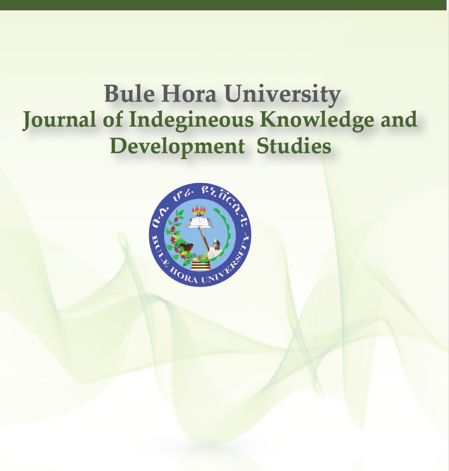The Role of Oromo Kinship Structure in maintaining Gada System as Indigenous Democratic Governance: The Case of Guji Oromo, Southern Ethiopia
Keywords:
Gada System, Guji Oromo, Indigenous Governance, Kinship StructureAbstract
Oromo, the largest populated nation in Ethiopia, are known for their remarkable indigenous democratic governance system known as ‘Sirna Gada’, denoted hereafter as Gada System. It was created hundreds of years before the inexistence of modern democracy and has been in effect since then being the omnipotent governor of their entire socio-economic and political courses, religious activities, and environmental administration rules. The system has its informal organizational structures and administrative units that are designed based on Oromo kinship structure, and thereby, play different roles in the rule of law, power exercise check and balance, and rules of power obtaining between the different parties once in each every eight years cycle. Therefore, identifying these kinship structures and their roles in maintaining the overall effectiveness of the governance system is crucial to understanding Gada system; which is the aim of this study. Accordingly, this study is employed qualitative research approach based on the data gathered from key informant interview and focus group discussion that sampled by purposely sampling and technique employed with the relevant experienced participants of Guji Oromo. The results are drawn by analyzing the obtained data using the contextual and thematic interpretation. Thus, there were well-designed kinship structures in the Guji Oromo Gada system having different roles with fairly distributed power and responsibilities across the horizontal and vertical hierarchical Guji-Oromo Gada system administrative structures. Accordingly, the power of Gada system started from the divine authority of from God termed as ‘Waqa Guracha’, recognized as the source of all power and authority who punish disobedient and injustice doers; hereby identified as the means for the enforcement of the rule of law that embedded in the heart every Oromo as eternal believes. Qalu, is the first and a supreme body on the earth as in structure of Gada system, believed to be an inherently anointed and as God-chosen man that he sent from the heaven from the constant royal family of the Obbitu clan. He serves as spiritual leader and acts as intermediator between God and people; who authorize the appointment of the supreme leader, Abba Gada, in Gada governance system. Abba Gada is a politician leader who elected from the periodical political party out of the five kinship-based party classes, called ‘Fincan Shan’ (the five parties). The Abba Gada power term is eight year with no possibility of re-election and extension for the next term for both the leader and his party. The power thereby rotates between these five parties in a predetermined sequential order at every eight years period; hence there is no competition between parties at a time – just aimed to avoid influences of ruling party on the fairness of election. It, therefore, regulates the check and balance in the Gada power by using the Oromo kinship structures, namely: Moiety, Misensa, Gogessa, Wolana, and Kadaddu to make the system more maintaining democratic governance through using the indigenous ways of Check and Balance system.
Downloads
Published
Issue
Section
License
Copyright (c) 2023 Bule Hora University

This work is licensed under a Creative Commons Attribution-NonCommercial 4.0 International License.

